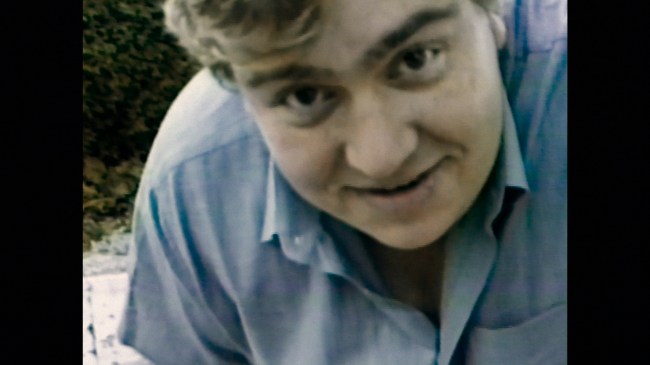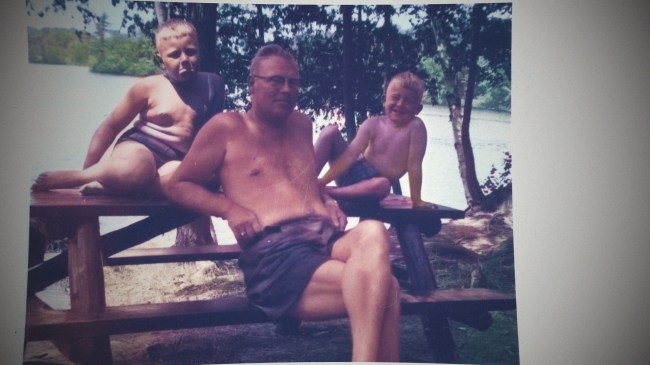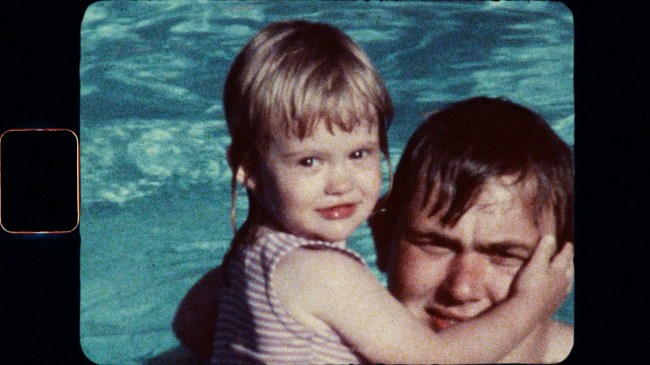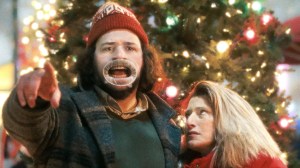On the surface, yes, the idea of making a documentary on the life of John Candy seems like a pretty great idea — I mean, who doesn’t love John Candy? — but as director Colin Hanks points out, well, wait, not so fast.
Now, let’s quickly note that Colin Hanks would know what he’s talking about because he, in fact, did make a documentary about the life of John Candy. And the problem that presented itself was, yes, everyone does love John Candy. As much as this is a man whose life should be celebrated, watching his friends and family talk about how great he is doesn’t necessarily make a riveting narrative for a film.
What Hanks deftly does with his “John Candy: I Like Me” is frame his film around Candy’s anxiety about his own mortality. John Candy’s father died from a heart attack when Candy was only five, so he lived with the notion and mindset that he was possibly living on borrowed time — something that, sadly, came to fruition in 1994. (It’s frankly shocking to think John Candy has now been gone for over 30 years. Even more shocking, Candy’s “Uncle Buck” costar Macaulay Culkin appears as a talking head in this film and reminds the viewer he is now older than Candy was when Candy passed.)
Ahead, Hanks takes us through the process of crafting a film based on a larger-than-life public figure who still means so much to so many people. And why he almost didn’t make the film because of his own personal history with Candy, who he had met on the set of his father Tom Hanks’ film, “Splash.” It was a history that was so special to Hanks that, maybe, it was best to just remember him as he already did.
Obviously — and thankfully — Hanks decided otherwise, and his film will open this year’s Toronto International Film Festival on Thursday night.
The following interview has been edited and condensed for clarity and length.
IndieWire: I had never seen “Yellowbelly.” It’s at least tied with the hardest I’ve laughed watching a movie this year.
Colin Hanks: Right? Conan O’Brien told me that story on the podcast, and I was like, “Oh, I’m going to have to check that out.” And then it wasn’t until we spoke with him for the film that we were able to track the sketch down, and I laughed so hard. Conan says it, the fact that that’s such an Oppenheimer moment for Conan, who is someone that I just admire so much. I’m so glad that a sketch from all the way back then that John was in is one of the hardest times you’ve laughed in a movie this year. That brings me so much joy.
This is your third documentary. How long have you wanted to make this one specifically?
After your first one, you have your list of the ones that you really hope one day that you’re going to make, and then you find out you don’t quite have the currency yet to make that one. The truth of the matter is everyone universally will say like, “insert person’s name,” and they’ll be like, “Oh, someone should make a documentary about him.” And I always go, “OK, but what is the film? What is the story that you’re actually really trying to tell? What is it saying?” Because, otherwise, I don’t want to just do a visual Wikipedia entry.
And you address it with Bill Murray at the beginning when he’s struggling to say anything negative about John Candy.
Exactly. Eventually, I got an email saying, “Hey, Ryan Reynolds wants to get in touch with you.” And so, he and I hopped on the phone, and we started talking. I already knew that Ryan was a massive John Candy fan, and he was just like, “I think there should be a documentary. I think you should direct it.” And that was when I really started to do the due diligence, and when I talked with Ryan, he had mentioned that Chris and Jen Candy were involved. So, I got in touch with them — and I’d known them through social circles for quite some time.
Once I figured out that John passed from the very thing that his father had passed away from? I’m 47. My mom passed when she was 49. John’s dad passed at 35. And John passed at 43. I started really taking a deep dive into my life in my late thirties, early forties. And really sifting through, like, childhood trauma, because everyone has it. That was the launching point for me.
It was really a sort of stupid, basic approach, but when you think of overweight actors who died young, the ones you think of all died of drug overdoses. So, “Wait, John died of a heart attack? His dad died of a heart attack when he was five?” It just became so much more personal, just because I am coming to the age that my mom was when she passed away, and that really puts a lot into focus. And so, to find out, after much, much more digging, that John really had that sense that he was living on borrowed time, and that he wasn’t sure if he was going to live past 35.

That’s a really interesting point. John Belushi and Chris Farley both died of drug overdoses at 33 and there’s this everlasting legend about them. John Candy doesn’t have that, even though he also died young.
Well, welcome to the creative process that I was going through. That was part of the initial, “Well, why is that? What is that?” And one of the things that I landed on was that John is so beloved by so many people, because of his everyman qualities. Everyone looked at him, and just went, “That guy. I like that guy. I want to spend time with him.” And he had that very salt of the Earth, blue collar — you just wanted to be with him.
What was your first introduction to John Candy as a kid? And I know the obvious answer is probably “Splash,” but I don’t want to assume.
Well, technically, “Splash,” yeah, but John was someone that my dad worked with. So, I didn’t necessarily think of him as John Candy.
Oh, I see.
I just saw him as like, that’s one of my dad’s friends. They work together. But, look, I have very, very vivid memories of being on the set of “Splash.” And seeing John, and Eugene Levy, in fact, and them all working together. So, that was my initial introduction. And then, obviously, “Volunteers” was also part of John being around. I have some very fond memories of John, a couple of dinner parties, and being at my dad and Rita [Wilson]’s wedding.
John left an impression on me even as a kid. Macaulay Culkin speaks to it in the movie when Mac says, “He made you feel important.” Even as a kid, he made you feel like your opinion mattered, and your emotions mattered. And that’s 1,000 percent accurate, because that was definitely how John made me feel. And then eventually then it becomes, oh, yeah — seeing him in “Spaceballs,” or “The Great Outdoors.” Like, “Yeah. That’s John. I know that guy.”
I feel like a really interesting perspective for you. A lot of filmmakers making this film can get the same interviews, can get the same footage, but you’re in an interesting position where he was your dad’s co-worker and met him. You have a memory of how he treated you.
Yeah. Very, very true. In fact, in a strange way, I think that was one of my initial reasons not to do it.
Why?
Just because, well, I met him, I have these memories of him, I don’t know if I want to dig into that. I’d much rather just have those memories as opposed to spend however many months or years of my life now collecting other people’s memories and going from there. But Chris and Jen [Candy] were so adamant. I don’t want to put words in their mouth, but they let it be known that it was their opinion that they felt like I was one of the only guys that can do it. Then that just made me go like, OK, well, let’s set myself aside here and do some digging.

You mentioned a film that I’ve seen a million times, “The Great Outdoors”…
Yes.
I think you did something really poignant when you put that scene of him on the boat, and he’s giving his family ring to his son [Chris Young], who says, “Oh, like you spent with your dad out here, and he did this for you.” And the way John Candy reacts to that, “Yeah.” And I can now tell he’s really sad.
But you know that he didn’t do that with his dad.
Honestly, I even watched it three weeks ago, because it’s on cable still nonstop. It hit me so hard.
Look, I felt like that was one of the things that we landed upon that ended up becoming, I think, a little bit of a responsibility. You don’t want it to just be like, “And then he made this movie.”
Right.
And I know this, as an actor: If I’m going to spend time away from my own family, and if I’m going to spend time away from my life, and, basically, put my life on hold to go make this movie? And the way that movies are made, basically, you don’t have a life. You wake up in the morning, you go straight to work and then you go home. And then you do the exact same thing the next day. You’ve got to find something in there to make that worth it. You know?
[Laughs] Sometimes you just need the money. But you want it to be worthwhile! And when Jen Candy was speaking to that idea, that he really did look for roles, and took roles that spoke to a specific slate that he wanted to sell people, a certain mentality, a certain way to be, that really made a whole lot more sense.
With “The Great Outdoors”…
What is ostensibly just a funny film, “The Great Outdoors”…
Right…
To be able to then find a moment where I’m watching a scene I’ve seen countless times, but I’m seeing it in a completely different way? That’s the kind of stuff that we really wanted to highlight. And I think we were able to accomplish that with a handful of moments from his films. But that one lands for me a lot. I’m actually really, really happy that you mentioned that, that particular point. Because that always really resonates with me.
He’s in a lot of movies. How did you pick the films to concentrate on? One I’m glad you did was “Summer Rental.” I’m a big fan. It’s a Carl Reiner film. And It’s his first starring role and I think it really shows what he can do.
Well, here’s the weird thing, there are so many of John’s films that I have not seen, because he was in a bunch.
True.
But “Summer Rental,” I’ve always thought of as one of the quintessential John Candy movies. And the fact that that was his first leading role, it felt like it was really important. And also it shows that in his first leading man role, he’s tapped by Carl Reiner.
Right…
Who is a legend and says, “I want to work with this guy.” And loves it so much that then he tells his friend, Mel Brooks, another comedy legend, “Oh, you’ve got to work with this guy. You’ve got to meet this guy. Not only is he great, he’s a great human being.”

You’ve made two prior documentaries. When you’re trying to get people to talk to you for this one, does that help? Do people say, “I know who you are but have you made a movie?”
Well, if they do, they don’t really tell me. But there are two bonuses here. I remember Marty Short, whom I’ve known for a very long time, he’s one of the very first people I approached about, “Should I do this?” He was like, “No one is going to say no to you. They’re all going to want to do it.” And so, that was helpful, but that doesn’t necessarily mean everyone is available.
In the film you spent some time on his role in “National Lampoon’s Vacation.” There’s always that story out there where they did reshoots for the ending, which is true, but gave John one million dollars to come in for his role. Is this true? He didn’t seem like a place in his career yet where that would happen.
I call this “the Bill Simmons conspiracy, because that was how it first came to my attention, hearing Bill Simmons talking about it at some point. Not that he coined it. No, I don’t believe that’s true. In fact, I talked about it with Chris, and I don’t think that’s true. I think, logistically, that doesn’t make much sense.
It doesn’t.
If you’re doing re-shoots on a movie, you’re not spending a million dollars willy-nilly.
Right, his biggest movie at the time was “Stripes.” “Let’s get the fourth lead from ‘Stripes’ and just pay him whatever he wants.”
[Laughs] No.
Now, five years later, that makes perfect sense.
Yeah. Exactly. Exactly.
Earlier you said, “You say someone’s name, and, oh, we should make a documentary about them.” Macaulay Culkin is amazing in this. As an interviewer, I’m just like, the stuff he’s saying to you is incredible. I would watch a Macaulay Culkin documentary, because that guy has to have some stories.
Yeah, he does. His life is incredibly well-chronicled in that way. And it’s interesting, Mac’s interview was a good reminder to me of just try and grab as much as you possibly can. Because it was late in the process, we were getting close to the wire, and I was just like, look, at the end of the day, he was a little kid. How much is he going to be able to express to us that speaks to our important themes?
And, of course, he actually reminded me of what my experience was meeting him. It was a really, really great reminder to just … You never know. To take a shot. Find out. His insight was just, honestly, profound.
It was. I was riveted. The way he openly talks about his own father, but then how John Candy would come over and like, “Hey. Everything OK at home?” That just says so much about John Candy, that he could pick up on that, even on “Uncle Buck.”
Well, it also says a lot about Mac. You know what I mean?
I do.
The fact that he realizes that now. And, by the way, let’s also talk about the two really big mind-blowing things that he reveals is that. A, he’s now officially older than John was when he passed away
I was going to bring that up. And he’s now eight years older than he was when John Candy was in “Uncle Buck.”
Wow. That’s crazy. But then his insight into John Hughes and John Candy’s relationship. And the fact that that’s the connection you should actually really make. Everyone thinks it’s Molly Ringwald, or him, but it really should be John.
But your instinct isn’t wrong. I’m sure at some point he may make a documentary, but who knows. I’m always a big proponent of … and this is something that was very adamant early on, just from day one, of the Tower Records documentary, I’m not in the business of ruining anyone’s life. Or trying to drag someone through parts of their life that they don’t want to go through.
That’s what I liked about you talking to Macaulay Culkin, because he, obviously, just wants to talk about this.
Yeah.
Some of the stuff I’m sure is probably hurtful to him, but it seemed like a positive experience? It didn’t feel like you were going somewhere with him that he didn’t want to go.
What’s interesting was, with “All Things Must Pass,” I really wanted to make the movie. It was a passion for me, because it was my first one. With “Nos Amis, the Eagles of Death Metal” doc, I didn’t want to make that documentary. The guys in the band didn’t want to make the documentary, because they didn’t want what was happening. But we knew each other, and we agreed, together, that we maybe don’t want to do this, but that it is important, not just for our healing, but then for everyone else that was involved in that [Paris] incident.
With this one, again, it was, well, I don’t know if I really want to do it. It’s really about Chris and Jen and Rose. Do they want to do this? And they were so adamant. And they were so like, “We really want to do this, and we really want to celebrate…” They really wanted to celebrate their father, and really remind people of that. When you have those agreements with your subject, so that you’re on the same page essentially, and there is no question as to what the motives are — that’s really, really important.
“John Candy: I Like Me” will premiere at the 2025 Toronto International Film Festival as the official Opening Night Gala. It will start streaming on Prime Video on Friday, October 10.

